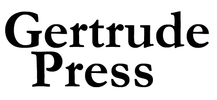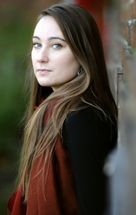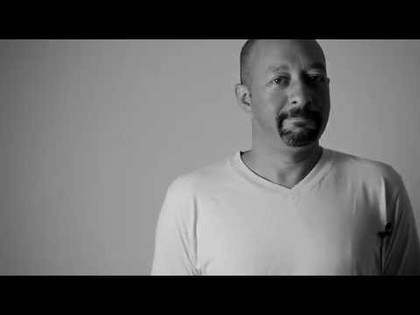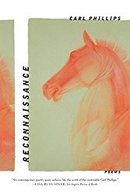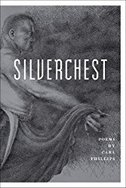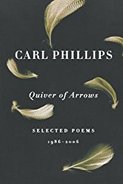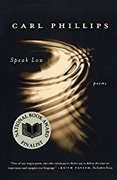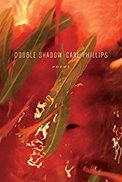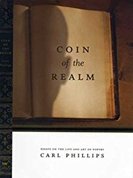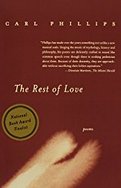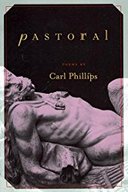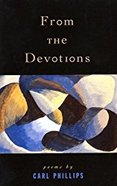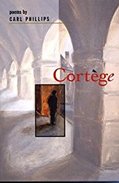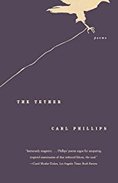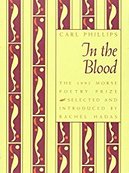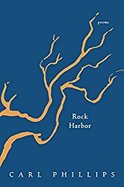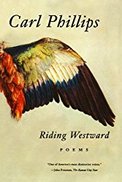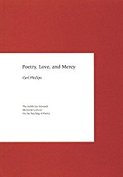LINEAGE :
|
I don’t think poems can come about unless there’s something to push against. For me, that was society’s assumptions about identity and how identity should be performed. |
|
This is the first in our LINEAGE project—a profile series pairing emerging writers with established artists in the LGBT community. The series, more globally, is meant to explore the shape of the LGBT literary community, and how it will continue.
I’m so pleased to have corresponded with Carl Phillips for our first conversation of the series. I’ve been drawn to Phillips’ work for years, for its meditations on desire and his public thinking, in and out of poems, about identity. Phillips is esteemed for his many books of poetry and criticism, but too, for his generosity, with students and editors alike, a capaciousness you’ll see in our conversation below. He is Professor of English at Washington University in St. Louis, where he also teaches creative writing. Phillips was elected a chancellor of the Academy of American Poets in 2006, and since 2011 he has served as the judge for the Yale Series of Younger Poets. His latest book, WILD IS THE WIND, is due out in 2018. |
|
|
Q: I wonder what lineage propelled you to where you are--poetic, familial, cultural? What, through conflict or disagreement, led you here as you were pushing against it?
Many aspects of my background have led to a sense of outsiderness that has surely informed the poems. I could begin with being born the child of a racially mixed (black and white) marriage, pre-Civil Rights. A large part of my childhood had to do with trying to fit in, having to prove to teachers that my mother (white) was my mother, having people ask my mother where she adopted these three black children. This turns out to have been good preparation for adulthood, where I have often been told I’m not ‘correctly’ black, or that I’m forgettably black, as in people assume I’m white. Meanwhile, though there was some struggling with sexual identity, I don’t think I had the language or other resources to know how to speak of it, to myself or to anyone else. That —and having been raised in a family where we just didn’t address difficult or complicated subjects—probably accounts for my coming out as gay so late, relatively speaking, at 32. The attempt to come to grips with one’s place in the world turns out to be something I do on paper more than anywhere else. I don’t think poems can come about unless there’s something to push against. For me, that was society’s assumptions about identity and how identity should be performed. Q: Last year you published a small essay for Poetry magazine's blog, Harriet, titled “Toward a Politics of Mere Being." The essay is one of a few pieces you’ve published on being read as a gay poet, or as a black one. You’ve noted that when your first collection was published in the early 90s, poems about being gay were relatively new to the American poetry reader. Certainly your work has helped to change that. When was it that you felt the landscape had dramatically shifted? In terms of the queer landscape, it seems to have shifted pretty quickly after 1992—that year, not only did I publish my first book, but so did queer poets (and poets of color) Timothy Liu and Rafael Campo. In some way, I suppose we must have presented a wide range of possibilities for how to speak as a queer writer—but also as queer people. There was more rawness to the work, as well—compared, say, to the more elaborated surfaces presented by queer writers like James Merrill or Richard Howard, both crucial writers in their own way, of course, but perhaps more guarded—necessarily, I want to say. The younger writers offered a more immediately open voice, as if sexuality were to be taken half for granted—all of this in keeping, of course, with how the conversation about queer rights had also begun to change. When it comes to race, at least in the black community, I’d say the shift was slower to be noticed, and I give most of the credit to the founding of Cave Canem by Toi Derricotte and Cornelius Eady. Most of the significant black voices today began at Cave Canem, a retreat which has inspired others such as Kundiman and CantoMundo—together, these have all three made for a swift diversifying of voices in our writing community. Q: When your first collection, IN THE BLOOD, won the Morse Prize in 1992, you weren’t yet out. Tell me something about what you found when you came into the queer literary community. How do you feel yourself a part of it now?
For whatever reason, I was pretty quickly taken up by a very specific queer literary community. Well, I guess there is a specific reason: my book was chosen for publication by Rachel Hadas. It was Rachel who introduced me to Sandy McClatchy, then editor of the Yale Review. He would later publish my poems and turn out to be a wonderful supporter of my work. That New York circle of queer writers is (or used to be) a relatively small one, so suddenly I’d met Richard Howard, another supporter of the work, and was reviewed prominently by Alfred Corn. Marilyn Hacker had early on arranged for a reading of queer poets at The New School, and included me in that. So, in a strange way, I got taken up by a decidedly older generation of queer poets—I think it also had something to do with my background in Classics, the way the poems don’t entirely abandon an older tradition… I didn’t really find a community of queer writers my own age for awhile. I think that had to do with my having just moved to St. Louis, which at the time was decidedly more conservative in its thinking and smaller in terms of a visible queer community, and with there being no social media at the time. Now is a very different story, of course. For one, I’ve become the older generation. To my surprise, though, I find that the younger writers seem to have interest in my work, and to acknowledge my influence on their own work. I guess I shouldn’t be surprised, since I certainly felt that way toward my elders, if we must use that word. I enjoy being something of a role model, when I am, and being able to contribute in ways beyond writing my own poems—especially by judging contests, and of course teaching, helping to keep a space for new voices and for diverse voices. ...to travel forward always also means carrying all of our previous selves along with us somehow. I think my whole point has always been how to reconcile how we behave with how we are expected to behave, given people’s assumptions about who we are. Q: In many places in the world, the poet is regarded as a public thinker. In the American context, poetry is often regarded as elite and out of touch with daily life. I wish that perception would change. Do you think it's important for poetry to be a bigger part of daily life for more people, or does poetry, like some other arts, attract a smaller and more particular group of people? What are some of the most effective ways you’ve seen poetry incorporated into public life?
Maybe this will seem shocking, but I don’t see why poetry—by which I mean the kind on paper, right now—has to or should be a part of people’s daily lives. Like the other arts, it adds texture to daily life, but people have existed forever without having that particular texture in their lives. Poetry often makes people have to reckon more immediately with things that are difficult to think about—life is difficult, for everyone, and I understand why not everyone wants to stare into the face of that difficulty. I get why people want to watch television instead, at the end of the day. But for me, poetry is out there all the time, anyway, so it’s a part of people’s lives even if they don’t know it. There’s music, for one—pretty much everyone listens to that. I find incredible poetry in a well-executed baseball play—does it matter if a sports fan doesn’t think of poetry when watching such a play? I don’t think so. But as for poetry on the page, there are ways that it can come into people’s lives as invitation rather than as something obtrusive. I think the Poetry in Motion project has been a hugely effective example. To get on a bus and look up and see a poem instead of an ad—it’s a great opportunity for those who want to read the poem. If they don’t, they don’t have to. But if just a handful of people read it and think a bit about it that day, the project has done its job. Meanwhile, poetry is still what most people turn to at the big junctures of a life—marriage, funerals, to name a couple. There’s the poetry of conversation. “I love you.” “I love you too.” That piece of dialogue right there is a poem. |
Q: You’ve taught for much of your life--have you found it mostly to be generative for your work and life or for you, has it been a career? Your prolificacy, a book every few years, feels remarkable, given all your teaching responsibilities.
Ha, it’s remarkable to me too, given that I feel like I hardly sit down and write. I sometimes think it has to do with not answering the phone, and refusing to spend time listening to poets complain, which they seem to do a lot of! Writing is very much about readiness, and I find the best way to be ready is to be silent, and to be doing things that distract me from the idea of trying to come up with a poem—routine is essential, in this regard, the kinds of routine that don’t require the poetry part of one’s brain, chopping vegetables, doing laundry, walking the dog… Teaching is differently generative, for me. For one, I try to assign things that will be useful for me as well—texts I’ve never read before, or that I should revisit. The discussion of literature, the joint exploration of it with students, is hugely inspiring, it gets me thinking about new subjects, or about old subjects in a new way, and this feeds into the work. I don’t believe you can be a good writer without having read great work—teaching is an incentive to do that, beyond my daily reading at home for myself. And of course, teaching is a way of interacting with the world—where else do poems come from? More pragmatically, it’s also the case that my teaching hours are pretty limited. Having taught high school for eight years, the university schedule has seemed a dream. I’ve been a little relentless, when it comes to desire, when it comes to restlessness. These poems attempt to sort out the cost of that, and return in a very different way to a subject that I was most concerned about in my second book: how to make a stable life with someone else? Q: Your work is a fantastic example of a mind and body at work in the poem itself--lovely coiled lines whose metabolic observations allow a window into a changeable mind. Poet as self-revelatory, the self as something deeply worth revealing.
You studied the Classics and taught Latin for some years. I wonder if your style has something to do with how you came to understand syntax in other contexts? (I met an older friend at a retreat once who demanded I learn another language—she insisted it would change the way I think, the way I know even simple feelings. She was right, if we forget the wine for the party; in Spanish, the wine was simply forgotten--we had nothing to do with it…) Sure, I think it’s easy to take one’s native language for granted, since it’s always been there, in a sense. And these days, grammar isn’t really taught anymore, as far as I can tell. So learning another language forces us to look closely at how sentences get made, how meaning gets made, and how that happens differently from how it happens in our own language. Studying Classics certainly had something to do with my understanding of syntax, though I would say it really began with learning German in fifth grade, when I lived on an army base in Germany for four years. It took me a while to realize that my attraction, in college, for sentences in the novels of Henry James, George Eliot, Proust had a lot to do with how a Classical background was once a regular component of a good education—those writers are masters of sentence-making, and I learned a great deal from them. I should also mention that, when studying Classics, I encountered the prose of Cicero, Tacitus, and Thucydides—all three of them, differently, deploy syntax as a means of saying one thing while purporting to say another thing. Which is to say, I learned from them that syntax is a tool, can be used to manipulate thought. Which is to say, syntax is erotic, and dangerous, and essential. Q: In an interview with the Kenyon Review some years ago, you said, "I think of all of my books as a single, sustained kind of meditation on—oh, on the ways in which the forces of being human (desire, for example, loss, conquest) shape a sensibility over time...”
Your latest book, RECONNAISSANCE, was published in 2015. I wonder if you would share what kind of poems you’re writing now—what piece of this meditation has your attention lately? How do you know when one part of that meditation (book) is over and another begins? RECONNAISSANCE was a book of fairly short poems, and was a sort of retreat from the field, as it were, a moment of reflecting on the damage left behind—relationship-wise—before looking at whatever future might lie ahead. My new book, WILD IS THE WIND, will be out in the spring of 2018. I think it’s an attempt to look more patiently at that possible future. The poems are longer, much longer, and more dense—though I hope they remain accessible. I think I’ve been a little relentless, when it comes to desire, when it comes to restlessness. These poems attempt to sort out the cost of that, and return in a very different way to a subject that I was most concerned about in my second book: how to make a stable life with someone else? As much as I resist the relationship between poetry and autobiography, no small part of this has to do, I’m sure, with a fairly new (four years) relationship—what does it mean, to start over again at 57? What in particular does it mean to do so with someone significantly younger, for whom all the struggling I’ve long written about has not been a struggle—at least not in the same way, since he was born into a time when the conversation about sexuality was already a much more open one? But the book isn’t specifically about that—it’s maybe more about (as boring as it may sound) getting older, looking back as much as looking forward, knowing that to travel forward always also means carrying all of our previous selves along with us somehow. I think my whole point has always been how to reconcile how we behave with how we are expected to behave, given people’s assumptions about who we are. The need to reconcile those things hasn’t diminished, it just keeps changing how it looks, the way the body itself does across time. To hear some of his poems, click here for Poets.org.
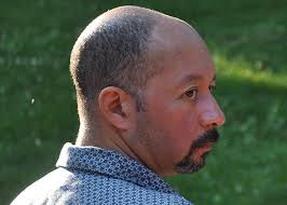
Carl Phillips has won the Theodore Roethke Memorial Foundation Poetry Prize, the Thom Gunn Award for Gay Male Poetry, the Kingsley Tufts Poetry Award, the Samuel French Morse Poetry Prize, and was a finalist for the National Book Award and the National Book Critics Circle Award.
His honors include the 2006 Academy of American Poets Fellowship, an Award in Literature from the American Academy of Arts and Letters, the Pushcart Prize, the Academy of American Poets Prize, induction into the American Academy of Arts and Sciences, and fellowships from the Guggenheim Foundation and the Library of Congress. Phillips served as a Chancellor of the Academy of American Poets from 2006 to 2012. He is Professor of English and of African and African American Studies at Washington University in St. Louis, where he also teaches in the Creative Writing Program. |
